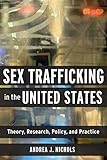Sex Trafficking in the United States : Theory, Research, Policy, and Practice / Andrea Nichols.
Material type: TextPublisher: New York, NY : Columbia University Press, [2017]Copyright date: ©2016Description: 1 online resource (336 p.)Content type:
TextPublisher: New York, NY : Columbia University Press, [2017]Copyright date: ©2016Description: 1 online resource (336 p.)Content type: - 9780231172639
- 9780231542364
- 306.3/620973 23
- HQ281 .N526 2016
- HQ281 .N526 2016
- online - DeGruyter
- Issued also in print.
| Item type | Current library | Call number | URL | Status | Notes | Barcode | |
|---|---|---|---|---|---|---|---|
 eBook
eBook
|
Biblioteca "Angelicum" Pont. Univ. S.Tommaso d'Aquino Nuvola online | online - DeGruyter (Browse shelf(Opens below)) | Online access | Not for loan (Accesso limitato) | Accesso per gli utenti autorizzati / Access for authorized users | (dgr)9780231542364 |
Frontmatter -- Contents -- Part I. Contemporary Debates of Theory, Research, and Policy -- 1. Sex Trafficking: An Introduction -- 2. Theoretical Perspectives and the Politics of Sex Trafficking -- 3. Pornography -- 4. Prostitution -- Part II. The Dynamics of Sex Trafficking in the United States -- 5. Survivors -- 6. Traffickers -- 7. Sex Trafficking Operations -- 8. Buyers -- Part III. Responses to Sex Trafficking -- 9. Criminal Justice System Responses -- 10. Social Services and Health Care Responses -- 11. The Anti-Sex Trafficking Movement in the United States -- 12. New Directions -- Notes -- References -- Index
restricted access online access with authorization star
http://purl.org/coar/access_right/c_16ec
Sex Trafficking in the United States is a unique exploration of the underlying dynamics of sex trafficking. This comprehensive volume examines the common risk factors for those who become victims, and the barriers they face when they try to leave. It also looks at how and why sex traffickers enter the industry. A chapter on buyers presents what we know about their motivations, the prevalence of bought sex, and criminal justice policies that target them. Sex Trafficking in the United States describes how the justice system, activists, and individuals can engage in advocating for victims of sex trafficking. It also offers recommendations for practice and policy and suggestions for cultural change.Andrea J. Nichols approaches sex-trafficking-related theories, research, policies, and practice from neoliberal, abolitionist, feminist, criminological, and sociological perspectives. She confronts competing views of the relationship between pornography, prostitution, and sex trafficking, as well as the contribution of weak social institutions and safety nets to the spread of sex trafficking. She also explores the link between identity-based oppression, societal marginalization, and the risk of victimization. She clearly accounts for the role of race, ethnicity, immigrant status, LGBTQ identities, age, sex, and intellectual disability in heightening the risk of trafficking and how social services and the criminal justice and healthcare systems can best respond. This textbook is essential for understanding the mechanics of a pervasive industry and curbing its spread among at-risk populations.Please visit our supplemental materials page (https://cup.columbia.edu/extras/supplement/sex-trafficking-united-states) to find teaching aids, including PowerPoints, access to a test bank, and a sample syllabus.
Issued also in print.
Mode of access: Internet via World Wide Web.
In English.
Description based on online resource; title from PDF title page (publisher's Web site, viewed 02. Mrz 2022)


